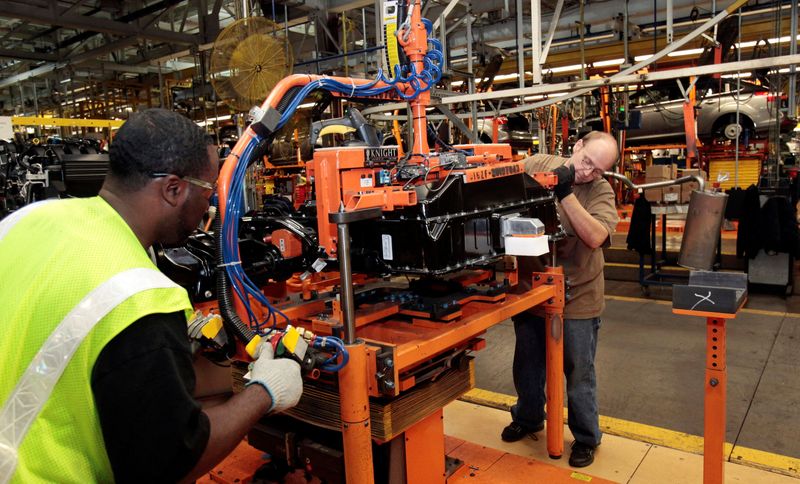By Lucia Mutikani
WASHINGTON(Reuters) -U.S. manufacturing activity slowed less than expected in July and there were signs that supply constraints are easing, with a measure of prices paid for inputs by factories falling to a two-year low, suggesting inflation has probably peaked.
While the Institute for Supply Management survey on Monday showed a measure of factor employment contracting for a third straight month, the ISM noted that "companies continue to hire at strong rates, with few indications of layoffs, hiring freezes or headcount reduction through attrition."
The better-than-expected ISM reading suggested that the economy was not in recession despite a decline in gross domestic product in the first half of the year. But businesses are sitting on excess inventories after ordering too many goods because of worries about shortages, hurting new orders.
"There are signs of new order rates softening as panelists are increasingly concerned about excessive inventories and continuing record-high lead times," said Timothy Fiore, chair of the ISM Manufacturing Business Survey Committee.
"Employment activity remained strongly positive in spite of the uncertainty with new order rates."
The ISM's index of national factory activity dipped to 52.8 last month, the lowest reading since June 2020, when the sector was pulling out of a pandemic-induced slump. The ISM index was at 53.0 in June. A reading above 50 indicates expansion in manufacturing, which accounts for 11.9% of the U.S. economy.
Economists polled by Reuters had forecast the index would fall to 52.0. A reading above 48.7 over a period of time generally indicates an expansion of the overall economy.
Four of the six biggest manufacturing industries - petroleum and coal products as well as computer and electronic products, transportation equipment and machinery - reported moderate-to-strong growth last month.
High inflation was also a major complaint among businesses even though overall price increases for inputs have started slowing considerably. Makers of chemical products said inflation is "slowing down business," and also noted an "overstock of raw materials due to prior supply chain issues and slowing orders."
Manufacturers of food products reported that "many customers appear to be pulling back on orders in an effort to reduce inventories." Textile mill operators said "continuing delivery and staffing issues have eaten away the bottom line."
COOLING DEMAND
The ISM survey's forward-looking new orders sub-index dropped to 48.0 last month from a reading of 49.2 in June. It was the second straight monthly contraction. Combined with a steady reduction in order backlogs, that suggests a further slowdown in manufacturing in the months ahead.
The cooling also reflects a shift in spending back to services from goods and the impact of rising interest rates as the Federal Reserve tackles stubbornly high inflation. The U.S. central bank last week raised its policy rate by another three-quarters of a percentage point. It has now hiked that rate by 225 basis points since March.
The economy contracted 1.3% in the first half of the year. Wild swings in inventories and the trade deficit tied to snarled global supply chains have been largely to blame, though overall momentum has cooled.
Supply bottlenecks appear to be easing. The ISM's measure of supplier deliveries dropped to 55.2 from 57.3 in June. A reading above 50% indicates slower deliveries to factories.
The improvement helped to curb inflation at the factory gate last month. A measure of prices paid by manufacturers plunged to 60.0. That was the lowest level since August 2020 and was down from 78.5 in June. But the road to low inflation will be long.
While the survey's measure of factory employment rose to 49.9, it remained in contraction territory for a third straight month. Technology companies like Tesla (NASDAQ:TSLA) have been laying off workers, but many manufacturers as recently as of June expressed difficulty finding workers.
There were 11.3 million unfilled jobs across the economy at the end of May, with nearly two job openings for every unemployed worker.
The ISM survey found that "although an overwhelming majority of survey panelists again indicate their companies are hiring, they are still struggling to meet labor management plans."
